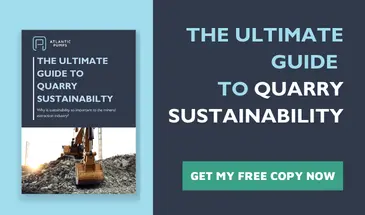Blog
Why Giving Quarries Planning Permission Is Crucial To Meet Britain’s Aggregate Needs
by Atlantic Pumps Admin
The granting of planning permission for a new quarry is a contentious issue. On one hand, there is a demand for the aggregate materials that quarries provide, such as gravel, sand and stone. On the other hand, there are concerns about the impact of quarries on the environment and local residents.
Barriers To Gaining Planning Permission For Quarries
There are multiple barriers to gaining planning permission for a new quarry. Many people are opposed to granting planning permission due to fears of environmental destruction from the operation of quarries. Plus, potential noise and air pollution in the surrounding area make them unwanted in residential suburbs. A private bill was introduced in early 2022 seeking to restrict quarry developments near residential areas.
Increased environmental demands have made it harder for companies to open quarries in recent years. As the population grows and we require more living space, resources become increasingly scarce.
Gaining planning permission means meeting stringent criteria regarding noise, dust and ecological impact, as well as completing lengthy environmental impact assessments. This has caused higher costs and longer lead times for projects, making advanced technical expertise essential.

Quarries And Sustainability
Granting quarries planning permission is a necessity for Britain's aggregate needs, and that doesn't have to be at the cost of sustainability. Quarries are becoming more sustainable via several initiatives, including:
- Reusing materials
- Incorporating Biodiversity and Sustainability Indicators into their management targets
- Using electric pumps
- Using renewable energy sources
- Turning old quarry sites into nature reserves
These measures are helping to make quarries more sustainable, and thus reduce the environmental impact of the industry.
Granting Planning Permission Is Essential To Meeting The UK's Aggregate Needs
Quarries provide the aggregates that we need to support Britain's construction industry. Aggregates are vital for many construction projects, as they provide a stable foundation and are used to create concrete, asphalt and mortar. It's estimated that four billion tonnes of aggregates will be needed over the next 15 years to meet demand.
As the demand for aggregates grows in Britain, it is essential that future supply needs are planned ahead of time to ensure that enough resources are available for the country's construction needs.
To meet this increased demand for new construction projects, quarries need to be granted planning permission as soon as possible so materials can be obtained in an efficient and sustainable way. Taking action now is key to meeting current and future aggregate demand in Britain.

Recent News
Subscribe
Categories
- Applications
- Coal washing
- dewatering
- Dredging
- Dust suppression
- Filter press
- Mine effluents
- Sand processing
- Silt pumping
- Sumps
- Thickener underflow
- Wash plant feeds
- Water treatment
- Brands
- Industries
- Brick & Concrete Block Manufacturing
- Construction
- Large scale manufacturing
- Mining
- Quarrying & Aggregates
- Ready mix concrete
- Recycling
- Sustainable Energy
- Location

Copyright © 2022 Atlantic Pumps Limited. All rights Reserved. Designed and Developed by JDR Group.

